Expenses That Homebuyers Often Overlook
Buying a home in Savannah can be an exciting process, but it’s one that can be riddled with unexpected expenses. You’ve worked hard to save for a down payment, and that is a massive accomplishment. It is the first major step toward owning your new home. However, that initial investment is just the beginning.
Many other costs arise during the transaction and even after you get the keys. Most first-time homebuyers, in particular, are surprised by these “hidden” expenses that pop up within the first year. This guide will walk you through the commonly overlooked costs so you can budget effectively and move forward with confidence, ensuring there are no shocks along the way.
Upfront Costs: Expenses Before Closing Day
Long before you sign the final papers, you’ll need to have cash ready for a few crucial out-of-pocket expenses. These fees are paid during your contract period to keep the transaction moving forward.

There are many expenses when purchasing a home. Most first time homebuyers are shocked by hidden costs within the first year.
1. The Home Inspection
Once your offer on a home is accepted, you will hire a professional to conduct a thorough inspection. While this is a required step, it’s mostly for your benefit. An inspection can uncover underlying problems, like issues with the roof, foundation, or HVAC system. These things could be costly down the road, giving you the power to renegotiate with the seller or walk away if needed.
Updated Cost: Expect the inspection to cost between $350 and $750, depending on the home’s size and location. Specialized inspections for things like pests, radon, or septic systems will be an additional fee.
2. The Home Appraisal
At the same time as the inspection, your mortgage lender will require a home appraisal. They will order a lender-approved, independent certified appraiser to assess the property’s value. This individual determines the home’s fair market value based on its condition, features, and the sale prices of comparable properties in the area. This step is critical, as it assures the lender (and you) that the property is worth the amount you’ve agreed to pay.
- Cost: While the lender orders it, the buyer typically pays the fee, which generally runs from $400 to $600+.
The Big One: Understanding Closing Costs
This is often the largest hurdle for buyers after the down payment. Closing costs are a collection of fees paid to the various parties who help facilitate the sale, including your lender, the title company, and others. As a general rule, you can expect your closing costs to be between 2% and 5% of the total loan amount.
These costs are detailed on your official Loan Estimate and Closing Disclosure documents. They are typically broken down into three categories:
3. Lender & Third-Party Fees
Your lender charges fees for creating and processing your loan, which can include loan origination, underwriting, and credit report fees. You will also see third-party fees for services like the title search, which ensures the property has a clean title, and any required survey or attorney fees.
4. Property Taxes and Prepaid Items (Your Escrow Account)
Sure, everyone knows about property taxes, but the amounts can vary wildly from one locale to another, so don’t make assumptions. It’s critical to check the rates for your specific area early in the process.
Once you agree to a mortgage, you will almost always be required to set up an escrow account. This is a special account managed by your lender to pay your property tax and insurance bills on your behalf. At closing, you will prepay several months’ worth of these expenses to fund the account. Then, as part of your total monthly mortgage payment, you’ll deposit a set amount (usually 1/12 of the anticipated annual cost) into the account. This assures the lender that their investment is protected, but it’s an extra monthly amount you must be prepared for.
Tax Deductions for the Homebuyer
Life as a Homeowner: The Ongoing Expenses
Once the papers are signed and the keys are in your hand, your financial responsibilities shift from one-time fees to recurring costs. New homeowners, in particular, tend to forget they are now solely responsible for every expense related to the home.
5. Utility Costs
Like property taxes, utility bills can vary significantly. If you are moving from an apartment into a home for the first time, you might be shocked by the discrepancy. It is generally cheaper and easier to keep a smaller apartment heated or air-conditioned, especially when it is surrounded by other units. A stand-alone home doesn’t have this luxury, so make sure you anticipate higher-than-usual utility bills after relocating.
6. Homeowners’ Association (HOA) Fees
If your new home is in a community overseen by a homeowners’ association, you will be expected to pay regular dues. These HOA fees can be billed monthly, quarterly, or annually and cover the maintenance of shared community amenities. Be sure to anticipate this expense, because it can easily be a bill for several hundred dollars or more.
7. Flood and Hazard Insurance
Your standard homeowners’ insurance policy does not cover everything. If you live in an area prone to floods or hurricanes, you will need to purchase an additional, separate policy for adequate protection. It’s crucial to speak with your insurance agent about your need for flood insurance as well as other types of coverage.
8. Long-Term Maintenance Costs
From a leaky faucet to a new roof, you are now the chief financial officer for all home repairs. While you might only encounter a major, expensive repair once every few years, it is critical to have a long-term savings account dedicated to home maintenance. Experts recommend allocating 1 percent of the home’s value toward these costs each year. For a $300,000 house, that’s $3,000 annually. This planning ensures you have the funds ready when you inevitably need them.
Your Expert Partner in the Process
Navigating the financial landscape of buying a home can feel complex, but being prepared makes all the difference. When you understand the full scope of the costs, from the upfront fees and closing table expenses to the long-term responsibilities of homeownership, you can move forward with confidence and make smarter decisions. Knowledge is your greatest asset in this journey.
Now that you know what to watch for as a homebuyer, you can better prepare for a smooth and successful closing. The best way to ensure you don’t miss a single detail is to work with an experienced real estate team that can guide you every step of the way.
If you’re ready to begin your home search, contact the Heather Murphy Group today. We are here to help you anticipate these costs, connect you with trusted local professionals, and ensure your path to homeownership is as seamless as possible.










